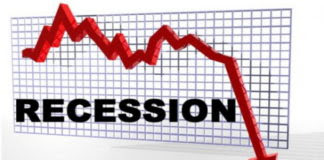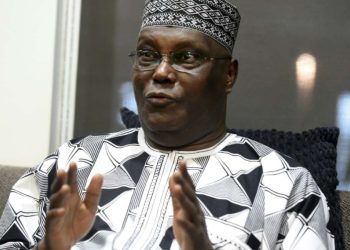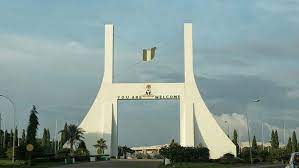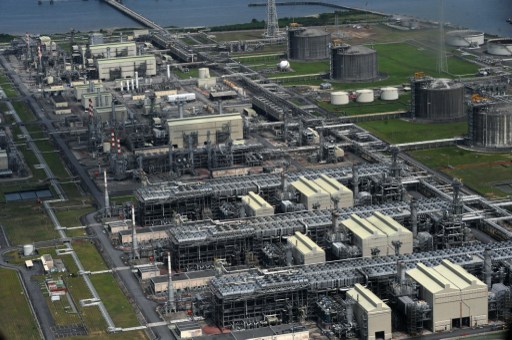
By Tanko Mohammed
For the second time in five years, Nigeria’s fragile economy has entered into a deep recession.
The National Bureau of Statistics (NBS) reported on November 21, 2020 confirmed that aside that of 2016, Nigeria has entered another recession as the Gross Domestic Product (GDP) has contracted for the second consecutive quarter by 3.62 percent in the third quarter of (Q3) 2020.
A recession is a period of decline in general economic activity, typically defined when an economy experiences a decrease in its gross domestic product for two consecutive quarters.
The nation, Africa’s biggest economy, is currently grappling with a debt burden of $86 billion, inflation rate of 14.23 per cent, and a dip in national revenue by 60 percent.
Production in oil and non-oil sectors has dipped and unemployment spiralled, all caused by impact of coronavirus pandemic and global economic crisis, especially the glut in crude oil, the main source of revenue to sustain the 200 million people of Nigeria.
Economic recession is defined as two consecutive quarters of negative Gross Domestic Product (GDP) growth. Negative GDP growth is also referred to as a contraction.
According to NBS report for the third quarter of 2020 the nation recorded GDP growth of -3.62% though an improvement from the -6.10% growth recorded in the second quarter.
“Nigeria’s gross domestic product (GDP) recorded a growth rate of –3.62% (year-on-year) in real terms in the third quarter of 2020.
“Cumulatively, the economy has contracted by -2.48%. While this represents an improvement of 2.48% points over the –6.10% growth rate recorded in the preceding quarter (Q2 2020), it also indicates that two consecutive quarters of negative growth have been recorded in 2020.”
NBS stated on its website that, furthermore, growth in Q3 2020 was slower by 5.90% points when compared to the third quarter of 2019 which recorded a real growth rate of 2.28% year on year.
It said that the performance of the economy in the third quarter (Q3) reflected residual effects of the restrictions to movement and economic activity implemented across the country in early second quarter (Q2) in response to the COVID-19 pandemic.
“As these restrictions were lifted, businesses re-opened and international travel and trading activities resumed, some economic activities have returned to positive growth. A total of 18 economic activities recorded positive growth in Q3 2020, compared to 13 activities in Q2 2020.”
“During the quarter under review, aggregate GDP stood at N39.089 trillion ($108 billion) in nominal terms. This performance was 3.39% higher when compared to the third quarter of 2019 which recorded an aggregate of N37.806 trillion ($104 billion).
This rate was, however, lower relative to growth recorded in the third quarter of 2019 by –9.91% points but higher than the proceeding quarter by 6.19% points.
Nigerian economy has been broadly classified into the oil and non-oil sectors and currently with average daily oil production recorded in the third quarter of 2020 stood at 1.67 million barrels per day (mbpd), or 0.37mbpd lower than the average production recorded in the same quarter of 2019 and 0.14mbpd lower than production volume recorded in the second quarter of 2020
“Real growth for the oil sector was –13.89% (year-on-year) in Q3 2020, indicating a sharp contraction of –20.38% points relative to the rate recorded in the corresponding quarter of 2019.’’
Oil growth decreased by –7.26% points when compared with oil sector growth recorded in Q2 2020 (6.63%).
Quarter on quarter, however, the oil sector recorded a growth rate of 9.64% in Q3 2020. The sector contributed 8.73% to total real GDP in Q3 2020, down from 9.77% and 8.93% respectively recorded in the corresponding period of 2019 and the preceding quarter, Q2 2020.
The non-oil sector grew by –2.51% in real terms during the reference quarter, which is –4.36% points lower than the rate recorded in Q3 2019 but 3.54% points higher than in the second quarter of 2020.
The non-oil sector was driven mainly by Information and Communication (Telecommunications), with other drivers being Agriculture (Crop Production), Construction, Financial and Insurance (Financial Institutions), and Public Administration.
“In real terms, the non-oil sector contributed 91.27% to the nation’s GDP in the third quarter of 2020, higher than its share in the third quarter of 2019 (90.23% ) and the second quarter of 2020 (91.07%).”
Manufacturing sector contracted by -1.51% in Q3 2020 from -8.78% in Q2 2020 and 1.1% in Q3 2019. The contribution of Manufacturing to nominal GDP in Q3 2020 was 13.56%, higher than in the corresponding period of 2019 (12.34%) and the second quarter of 2020 (11.79%).
Finance minister Zainab Ahmed on May 21, 2020 told the nation that Nigeria would slide into a recession but with reduced impact if the Economic Accessibility Committee continues with its stimulus packages.
Mrs Ahmed said: “And if we applied all that have been proposed and we are able to implement it we may end up with a recession that is -0.4 per cent. In any case, we will go into recession but what we are trying to do is to make sure that it is shallow so that we will quickly come out of it come 2021.”
She said the Nigeria is going through a very difficult time because the challenges have now doubled – there is health challenge, there is an economic challenge.
“We have to feed the people and you can only feed the people if people go out and farm. We are a very large population, we don’t want to take the risk and we don’t have enough fund to cushion the effect,” she said.













